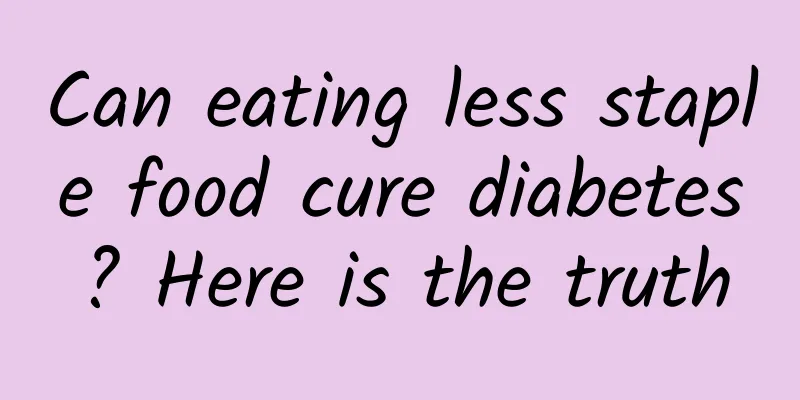Can eating less staple food cure diabetes? Here is the truth

|
There is a rumor that diabetes can be cured by giving up starchy foods, eating less fruits with high fructose content, not drinking beverages, and refusing processed foods. The truth is: there are many ways to treat diabetes. In most cases, improvement in the condition is the result of the combined effects of multiple methods such as diet, exercise, and medication. This cannot be used as a reason to unilaterally exaggerate the effectiveness of a specific method. At the end of the 18th century, British doctor John Rollo was the first to notice the therapeutic value of a low-carb diet for diabetes. The "low-carb diet, high-fat, high-protein diet" he advocated had a far-reaching impact, making people realize the adverse effects of a high-carb diet on diabetes, but it is also the source of many current dietary misconceptions, such as "diabetics cannot eat fruit" and "it doesn't matter if you eat any vegetables". If the staple food is excessively restricted, and carbohydrates are not eaten for a long time or are eaten very little, fat will have to provide excessive calories, which will have an adverse effect on the brain and myocardial metabolism that mainly relies on glucose for energy. At the same time, excessive intake of high fat and high protein will increase the metabolic burden on the liver and kidneys, and the incidence of cardiovascular and cerebrovascular complications may also increase as a result. A scientific diabetes diet pattern is not absolute or single. Instead, it should be based on each person's different tastes and preferences. Under the guidance of professionals, one should choose a personalized diet that suits him or her, and continue to enjoy one's favorite foods in a healthy way to the maximum extent, rather than blindly pursuing a certain dietary "special effect." Zhang Tian, chief nutritionist of the Nutrition Department of China Medical University Air Force General Hospital, said that for diabetic patients, the following points should be noted in their diet: Control the total calories from all foods consumed daily to achieve or maintain ideal body weight; Eat a balanced diet, choosing a variety of nutritious foods; Limit the intake of saturated fatty acids and choose high-quality protein in moderation. On the premise of limiting the total amount of fat, vegetable oil should be used as much as possible; limit the intake of cholesterol in the diet, and do not eat or eat less cholesterol-rich foods such as animal offal, egg yolks, etc.; Appropriately relax restrictions on staple foods, reduce or prohibit foods containing monosaccharides and disaccharides; Eat high-fiber meals and choose foods with a low glycemic index. You can choose coarse grains (such as buckwheat noodles, oatmeal, corn, etc.) and whole grains in moderation, and eat more green vegetables; Reduce salt intake to less than 6 grams per day; Eat small meals frequently and at regular times and quantitative times; Drink plenty of water, limit tobacco and alcohol, and quit smoking; Use steaming, boiling, stewing or cold dressing to process food, and avoid frying, deep-frying, fumigation or shabu-shabu. (Compiled by Beijing Science and Technology Association, Beijing Health Commission Air Force General Hospital) |
>>: Cherish your knees and keep running
Recommend
What should I do if both fallopian tubes are blocked?
Bilateral obstruction of the fallopian tubes is a...
What are the problems with having sex during menstruation?
Today's living conditions are much more open ...
Can I use athlete's foot ointment during breastfeeding?
There is an old saying: Athlete's foot is not...
Does leucorrhea mean menstruation is coming?
Vaginal secretions are secretions from the vagina...
No gestational sac found, only dark areas
Early pregnancy is usually tested with test strip...
Can eating chili peppers often help you live longer? A meta-analysis of 570,000 people in four countries including China and the United States
In recent years, many studies have shown that chi...
Acupoint Breast Massage
The importance of perfect breasts to women is sel...
What to do if your menstrual period is irregular after childbirth
After a miscarriage, many women will find that th...
How long to breastfeed after taking amoxicillin
Amoxicillin capsules are a common household antib...
What to do about endometriosis pain?
Endometriosis is a common gynecological disease i...
What are the symptoms of a urinary tract infection in pregnant women?
In daily life, urinary tract infection is a relat...
How to resume menstruation at 45
Under normal circumstances, generally speaking, w...
What should I do if my menstrual period doesn't come out?
When women have their period, they may not have m...
Can I get pregnant right after my period?
Many people think that pregnancy will not occur r...
How can women who love to eat eat healthily?
Of course, eating snacks is indispensable when wa...









